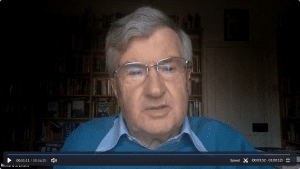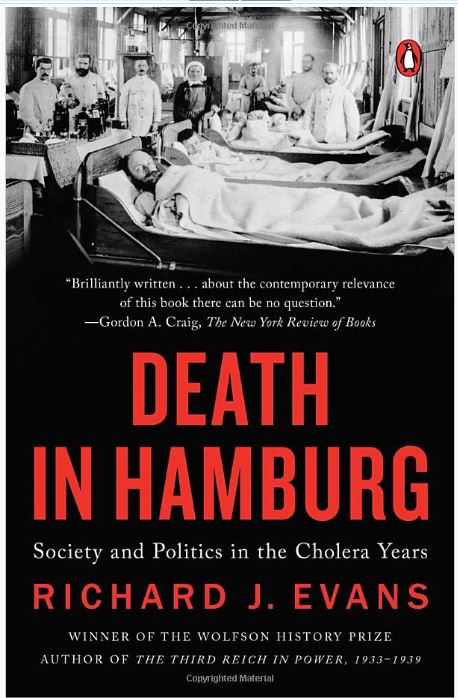Cholera is a waterborne infectious disease that triggers severe watery diarrhea that can lead to dehydration and even death if left untreated. In most cases, cholera is caused and transmitted by drinking water or eating food that is contaminated by human waste. Even though modern water and sewage treatment systems have largely eliminated its spread, severe disruptions in the water supply in the aftermath of natural disasters that mix water and wastewater still give way to cholera outbreaks. In 1892 the city of Hamburg in Germany experienced a cholera outbreak. Of its 600,000 people, 10,000 died in a matter of months. In an early-career book, Death in Hamburg, Sir Richard J. Evans, the Regius Professor Emeritus of History at the University of Cambridge, studied this epidemic. In the context of the ongoing COVID-19 crisis, Professor Evans revisited the topic as the opening talk in the series “COVID-19 in Transatlantic Perspective,” organized by Professor Manuela Achilles, director of the Center for German Studies, in collaboration with the Embassy of the Federal Republic of Germany.

Why did the cholera epidemic occur in Hamburg, and how was this city different from the rest of Germany?
Hamburg, one of the world’s half-dozen largest seaports, was the main point of embarkation for Russian emigrants travelling to America to escape persecution and make a new life. The city was an autonomous state in the federal structure of Imperial Germany, responsible for its own internal policies. It was ruled by a Senate composed of representatives of the great merchant families, under an electoral system that was heavily weighted in favor of the propertied and the wealthy. In the controversies that raged in the 19th century over the causes of cholera (a new disease that reached Europe from Asia at the beginning of the 1830s), the “contagionists,” led by Robert Koch, whose discovery of the cholera bacillus in 1884 was hailed as a supreme achievement of German bacteriological science, had defeated the “miasmatists,” who held that the disease was caused by an invisible vapor rising from the ground. But in Hamburg the Senate refused to appoint medical officials who followed Koch’s line, since accepting that the disease was spread through infected water, and from person to person, implied quarantine measures to control outbreaks, and this would damage the city’s trade. The Senate was also adamant that if cholera broke out, there should be no “premature” announcement of its presence in the city.
Following a series of anti-Semitic measures taken by the Tsarist government in Russia, and serious famine conditions in the Russian Empire, the number of Jewish emigrants heading for America increased sharply. More than 70,000 passed through Hamburg and its sister city Bremen in the course of 1892. They were housed temporarily in barracks in the harbor area or cheap waterfront lodging houses before embarkation. These were not connected to any central sewage system and discharged human waste directly into the harbor, from where it was swept upstream in the river Elbe by the incoming tide. In August 1892 the weather had for some time been very hot, and the water level was low, so the effluvia reached the inlet into the city’s drinking water supply. Over the previous decades, the parsimonious city fathers had blocked expenditure on constructing a sand filtration system for the reservoirs that could have killed the bacillus. So the bacilli, which multiplied almost exponentially in the hot weather, reached every household that was connected to the central water supply.
When the first case of cholera occurred, on the night of 14–15 August, and other cases began to be reported, the Hamburg medical authorities refused to confirm the presence of cholera in the city for a week, giving the disease the chance to sweep through the city, causing thousands of deaths. Everywhere else in Germany and indeed in western Europe as a whole, including Bremen, Koch’s bacteriological explanation of cholera was accepted, and preventive measures taken, including monitoring incoming travellers. Only in Hamburg was there a major epidemic in 1892.
As you draw parallels between now and then, can you speak to role of the state in fighting the epidemic at the time, versus now?
By 24 August the epidemic had taken over the city, and the inadequacy of the Senate’s response had become obvious. The Kaiser’s government in Berlin sent in Robert Koch with a team to sort things out. They elbowed aside the Hamburg medical authorities, and quickly set up special field hospitals provided by the Prussian Army, isolated sufferers and disinfected their homes and belongings, quarantined the city (which had already been cut off by quarantine measures imposed on ships from Hamburg by other seaports, from London to New York), and arranged the distribution of free, uncontaminated water from tankers stationed on the main city squares. Koch organized a major publicity campaign telling people to boil water before they used it for any purpose whatsoever, to wash their hands after going to the bathroom, and to take other hygienic precautions. The Senate was forced to help in this effort. Cases and deaths dropped precipitously and by early October the epidemic was effectively over.
The decisive measures were taken by the central German state, which was a semi-autocratic, authoritarian polity; crucially, the German government was unanimously and unreservedly behind Koch, who was regarded as the German rival to the French scientist Louis Pasteur, and an example of the superiority of German science. Scientific discoveries were news in 19th-century Europe, rather like the discoveries made by European explorers; the first scientist to discover the causes of a major disease was fêted like the first man to reach the North Pole. The publicity was huge. Moreover, the major political party in Hamburg, the Social Democratic Party of Germany, which represented the city’s burgeoning working class, was a strong believer in the benefits of science. A moderate Marxist party, it considered Marxism to be the science of human society, and fully supported modern medicine and the benefits it brought to the masses through, for example, the system of medical insurance introduced in Germany in the 1880s by Chancellor Otto von Bismarck. The Party was highly critical of the Hamburg Senate, but it did a great deal to facilitate the measures taken by Koch after his arrival. A strong state, therefore (the German state), convinced of the benefits of science and backed by the most important political party—one, however, that was shut out of the city’s governance by its unequal electoral system—was crucial to the mastering of the epidemic within a short space of time. The initial refusal of the Hamburg state to accept the dominant medical science of the day, along with its reluctance to take measures to combat the epidemic, had been a major factor in the death of some 10,000 people from cholera.
As you were comparing now versus then, you emphasized the very different role of the state and of ideology, and the tension between the economic and business interests in fighting the pandemic. Can you elaborate some on these roles?
The Hamburg Senate’s refusal to follow scientific advice may have been caused by its prioritization of economic interests, but the result was that the city’s economy was far more badly damaged by its initial inaction than it would have been had the Senate followed the advice of what was then modern science. Trade with the rest of Germany, and the world, came to a standstill. The financial losses suffered by Hamburg’s trade and shipping companies were immense. The city was forced to spend millions on filtrating the water supply, taking measures to combat the epidemic, introducing new sanitation measures, clearing insanitary slums, and more besides. The city budget recorded large deficits in 1892 and 1893 and still had not recovered by the turn of the century. The Social Democrats, an explicitly anti-capitalist, anti-business party, swept the board in the national elections of 1893 (for which all adult males had the vote) and were able to force an extension of voting rights in Hamburg’s city electoral system, thanks to the discrediting of the merchants’ business-oriented rule by the epidemic. Finally, the epidemic seriously weakened Hamburg’s autonomy in relation to the central government in Berlin. Ultimately, therefore, the Senate’s business-oriented approach to the crisis had proved massively counterproductive.
Did this dramatic event in Hamburg bring about significant change, and hence, do you expect significant change in countries such as the United States that have been hit hard by COVID-19 for that matter?
The changes brought about by the epidemic were in some cases short-lived. The extension of voting rights was reversed in 1906 when the mercantile and property-owning classes found they had given too much power to the Social Democrats. However, the political system in the city did undergo serious change, as an organized liberal reformist party emerged to challenge the traditional hegemony of economic interests—merchants and property owners—in the city’s constitution. Clearance of the insanitary housing on the waterfront stalled until a massive strike of dockworkers in 1896; most of them lived in these areas, so “hygienic improvement” provided a good excuse for pushing them out of the city center. The acceptance of greater state intervention in society proved irreversible. On a more general level, the impact of catastrophes such as the 1892 cholera epidemic is always multifaceted; often what happens is an acceleration of already existing trends, such as, for example, the rise of the Social Democrats.
In the early 21st century the situation is in many ways rather different. The enormous prestige of science in the later 19th century has been severely damaged by, for example, the development and (in 1945) deployment of nuclear weapons. The rise of populist movements and politicians in the wake of the economic crash of 2008/09 has fueled the spread of skepticism about science, since scientists are widely regarded by populists as part of the elites they are dedicated to overthrowing. Internet and social media have facilitated the dissemination of irrational conspiracy theories and misinformation. While the working masses in Hamburg in 1892, poorly educated but strongly influenced by the Social Democrats, obeyed the instructions of the medical authorities once Koch came in to the city, there is no comparable political movement today that conceives of itself as guided by “science.” Even if a safe and effective inoculation against the coronavirus is found, it is more than likely that a quarter or more of the population will refuse to accept it.





